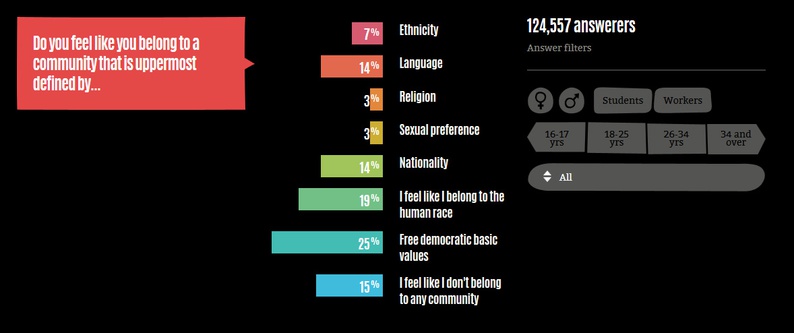
Generation What?: A self portrait of Europe’s youth (1/2)
Published on
Translation by:
Hannah Embleton-Smith"You are the most educated generation the world has ever seen. It's absolutely necessary that you emerge with force and dynamism." The minds behind the project Generation What? are helping Europe’s youth to create their own self-portrait. The vast comparative survey not only allows young people to get to know themselves; it ultimately brings them together as an active community.
The survey has already received responses to almost 10 million questions from over 250,000 individuals. 12 European countries are actively participating and there’s an international version for the rest of the world. As of yesterday, "Generation What?" has quite literally taken hold of the web. It aims to respond to the "need for community" felt by European citizens across the continent. We spoke to Christophe Nick, founder of the production company and co-creator of the project.
 cafébabel: How did the idea for this project come about and gain such momentum?
cafébabel: How did the idea for this project come about and gain such momentum?
Christophe Nick: It's been 15 years since I started working on documentaries, looking at the most fractured areas of French society. In the early 2000s, I put together a series on everyday violence. Next, we dug the knife in deeper and studied the education system; after that we focused on the workplace. In 2010 when the economic crisis was at its peak, it became clear that the biggest fracture in society was the one silencing our youth. For that reason, we wanted to base our fourth series on the new generation. But we didn’t limit ourselves to our usual documentary technique; we set out to get young people themselves involved. If television could give a portrait of a generation, the web could really ensure that young people came face to face with their self-portrait.
After months and months of work, we launched the project in France. It was a huge success, so we definitely wanted to carry it out across Europe to find out whether the crisis felt in France was specific to us, or if other countries felt it too – and if so, how
We’re not going to stop there, either. We want to extend the survey to the Arab world, Japan has also contacted us and the United States are interested in light of the upcoming elections. It could become global.
cafébabel: Are you expecting the same level of success?
Christophe Nick: I'm not sure it will go as far as that. It’s completely unbelievable because the pace would be quicker than what we saw in France, which we’d already found remarkable. There’s something that takes hold of social networks – even in countries that aren’t so well connected, like most eastern European countries or the Balkans. It’s been instant. A lot of our traffic even comes from the US. The Massachusetts Institute of Technology (MIT) is encouraging everyone to take part. There are some questions on Europe where they have nothing to say, but otherwise the response is staggering.
 cafébabel: What motivated you the most while setting up the platform?
cafébabel: What motivated you the most while setting up the platform?
Christophe Nick: It’s been very difficult to get participating countries to work with each other and commit to the project, because as a whole they are panicking about young people. They’re worried by the fact that young people no longer pay them any attention. We told them "it’s time to put young people on your radar". They are convinced, but it’s also something that terrifies them. In a very broad sense, that's indicative of the European crisis. Looking at the problem through the filter of television can tell us everything; the message being sent out is: "We’d really like to, but we don’t know how to talk to young people anymore; we don’t know what their place is." Our mission has been to convince these countries to prioritise young people, to be quiet, listen, let them speak –better yet, to tell young people to speak up and take control. It's been a real wake up call for them.
cafébabel: Do you think that by encouraging young people to "speak up", the project could have real political impact?
Christophe Nick: It’s possible. First, if the project continues to grow at this pace, in two weeks' time more than a million European young people will have spoken, and such a speech carries weight. Second, when you take the questionnaire, you want your friends to take it with you. Together you start to have discussions and realise that we are not just a group of individuals – we’re really a community that isn't even aware of itself. That’s the most important factor in having an influence on society in general. Third, the survey asks so many questions that in the end we're ready to engage in a more qualitative consultation online, where we're asked to make suggestions. We should be developing this process to attain more calls for action, reform or new laws. Just like that, the project becomes more concrete. It's transformed into a set of demands.
On a deeper level, it’s really the idea of helping young people to realise it’s up to them to smash the glass ceiling that, on a certain level, is stopping them from entering society. Generation What? is an instrument, a tool at your disposal to allow you to be heard. The whole of Europe is suffering from young people's absence from decision-making. It’s the responsibility of a generation; it's high time that you break free from us and start to take your place!
---
Is the project available to all young people? How were the questions chosen? Is digital the latest weapon for protest? Read the second part of the interview.
---
This article was published by our local team at cafébabel Brussels.
Translated from Génération What? : le premier portrait de la jeunesse européenne (1/2)



